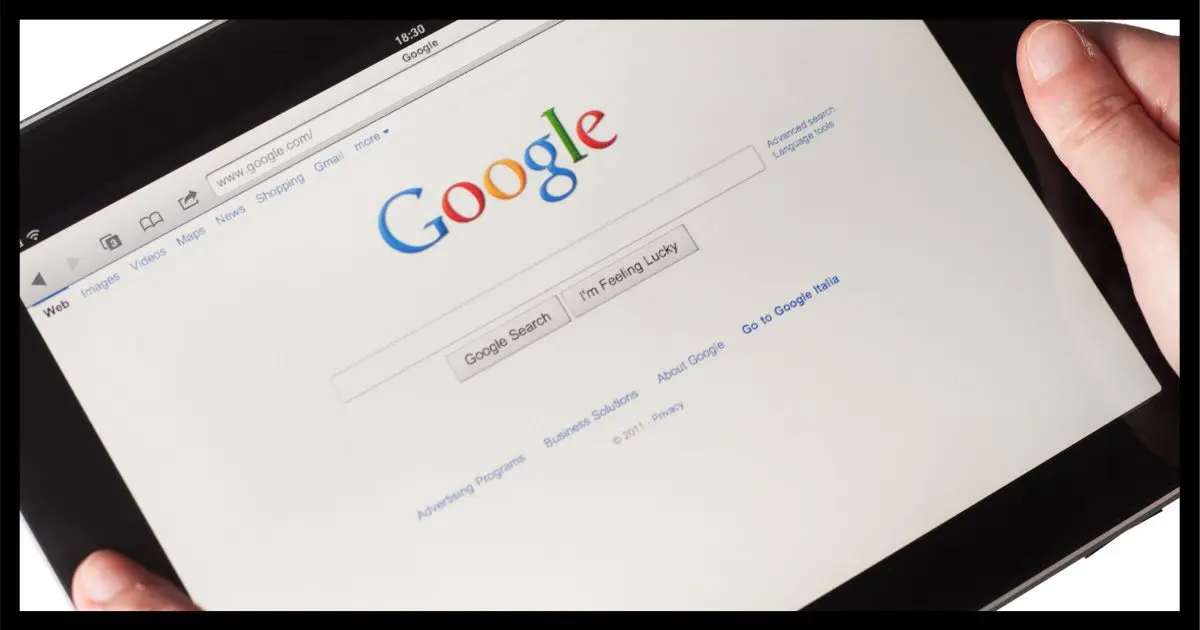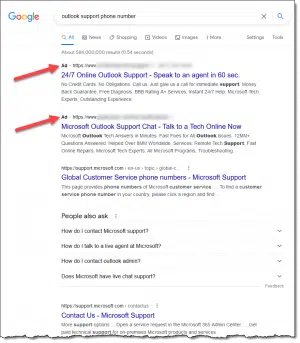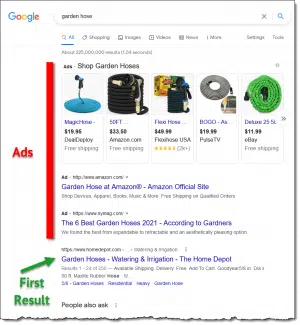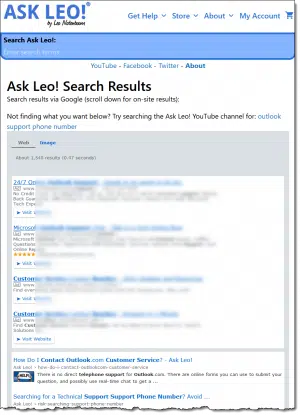These are not always the results you’re looking for.

I was listening to a podcast1 where the hosts discussed search results offering “help” with various government programs.
The results look legitimate. Some of them may be. But they’re displayed not because they’re a search result, but because they are paid advertisements appearing above or around the “real” search results.
The problem? Many of them are scams.
And this issue isn’t limited to government programs.

Beware of ads
You must understand that search results may contain advertisements. Advertisements are not the actual results, but are placed by companies who pay for the privilege of appearing above or alongside search results. Learn to never mistake an ad for an actual search result. The ads may have value, but they can also mislead. Be skeptical, but above all, learn to recognize ads in search results.
There are ads in search results
It’s critical to understand that many of the items appearing on search results pages are paid advertisements. They are completely separate — and possibly unrelated to — the actual search results elsewhere on the page.
Here’s a frustrating example:

This is a simple Google search for “Outlook support phone number”. The first two items look like search results, but they are not. Someone paid money for them to appear in that position for this search. The actual search results begin with the third entry, which links to Microsoft support.
Even though the two entries are labeled “Ad“, many people — many, many people in my experience — seem to ignore this, not see it, or not realize what it means. In this case, they’re looking for a phone number to call for help with Outlook (usually meaning Outlook.com), and they see phone numbers to call. (I’ve blurred out the actual numbers and names for reasons I’ll discuss in a moment.)
So they call, not realizing they’re not talking to Microsoft at all.
Help keep it going by becoming a Patron.
Ads are ads and nothing more
Remember that ads may or may not have relevance to your search, or answers to whatever you’re looking for.
Some are good and on target. One of the items I blurred above has been around for a while, and might even help, even though they fail to mention they are not free.
Other advertisements, however, are out-and-out scams. (This is the real reason I blurred the items in the image above. I don’t want to give them any publicity at all.) Many are nothing more than the tech support scam, except they’ve managed to get you to call them. Once you’re hooked, scammers will take your money, gain remote access to your machine to install malware on your system, or worse.
Looking for technical support isn’t my point, however.
Understanding that there are ads in search results is.
As I said, not everyone seems to understand this.
It’s more than tech
It’s not just technology-related searches that have ads: it’s everything. Here’s a search for “garden hose”.

The first part of the page — often the only part you see without scrolling down — is entirely advertisement. The first search result shows up after the ads.
Even I have ads
Advertisements are an important component of what keeps many websites free to use, and Ask Leo! is no different. Without ads, this site would not exist.
When you search for a topic on Ask Leo!, you are using Google search. I use Google because they’ve consistently done a better job understanding what you mean and relating it to the results in my content than any alternative I’ve tried. The ‘price’ to use their service, so to speak, is advertising.

Once again, the ads are above the actual site search results. They’re labeled as ads, and hopefully called out more so by being in their own box on the page.
I am not alone. The vast majority of free online resources you use every day are supported by advertising.
For better or worse.
It’s not that ads are necessarily bad
I’m not saying all advertisements are bad. Technology these days allows advertisements to do an interesting job of targeting what we’re looking for. Sometimes the ads really are, or lead to, the answer we’re looking for. And as I said, they support the massive amount of free information online.
But it’s important you know they are ads.
That way, you can make a knowledgeable decision about what to click on — or not.
So next time you search for something, pay careful attention to the results. Learn to distinguish between advertisements and actual search results.
Do this
Subscribe to Confident Computing! Less frustration and more confidence, solutions, answers, and tips in your inbox every week.
I'll see you there!
Podcast audio
Footnotes & References
1: Smashing Security 226: Cryptocrazies and NFTs includes a segment on this. Highly recommended podcast, very entertaining, but beware: language at times.




I work with a guy who sells vintage guitars online. He pays for every ad clicked on for his shop. If you click on a link to his website, he pays the amount of money per click he bid for ad placement. So, if you click on an ad accidentally and don’t buy anything, he still pays. So, be kind to advertisers. Only click on ads you are interested in. If I’m looking to buy something, I skip over the ads and click on the search result which is often the same as the link in one of the ads. I don’t know if I’ve ever clicked on a Google ad on a search page.
Advertisements that are included within an article can be sneakier than ads that are shown as part of a search result. Just now, I almost click on an actual eBay ad within this very article, thinking Leo had provided it as an example (ha-ha). This so-called example seemed interesting enough for me to want to enlarge it, and it did not display an “ad” label.
It’s interesting to note that when I did a Yahoo search on the same phrase (“Outlook support phone number”), no ads were shown on the first page of the search results, at least none that I could identify. Of course, I don’t know the quality of the results themselves.
But when I did a Yahoo search on “garden hose”, there were ads — and they were much more difficult to identify individually. The group of Yahoo ads at the bottom of the page was segregated by only two very faint horizontal lines. And the group at the top of the page, with a single “Ads” label, didn’t even have the lines, so you really had to guess which ones were ads.
A question for Leo, please: Usually, I just leave ads alone. But on occasion, an ad within an article, because of its size or position, will be too distracting, and I will close it by clicking on the “x” in the upper-right corner of the ad. Is it risky to do that? How likely is it that the “x” can/will do something other than close? Thanks.
It’s only risky if the ad link is to a dangerous website, which is rare unless you click on an ad from a questionable website such as a porn or clickbait site. If you accidentally click on an ad in a site like Ask Leo! the only thing that will happen is you’ll lose a few seconds closing the ad and the website hosting that ad will get a few cents for the click. Don’t do this on purpose to “help” the website. Ad providers will penalize the website if someone clicks on ads on that site too often as it looks like the website is manipulating the ad to make money.
If the ad’s legit, not a problem, but it may not make the ad go away. When I do it I get a dialog asking me why I no longer wanted to see THAT ad, and then replaces it with another.
Many sites (Ask Leo! included) display no ads if you’re signed in with a paying/supporting account.
I see that stuff on a smart phone (and generally avoid it already, like you mentioned in this article) since they don’t have a quality ad-blocker in general when doing the standard Google search stuff using ones voice etc. although one can install a good ad-blocker on the Firefox browser on a android smart phone for example and all of that junk goes away if you use Firefox and avoid the general Google voice search many use by default.
but on a proper computer, which I typically stick with, a browser paired with a quality ad-blocker (i.e. uBlock Origin (by Raymond Hill)) you don’t see any of that junk as I don’t know how someone can just browse the web in general without a good ad-blocker in place since even just using sites like YouTube have a bunch of ads etc, which I just straight up avoid as it’s nice being able to load sites like YouTube and get straight to the video you want to see without dealing with any junk.
so while I am guessing some sites don’t like people using ad-blockers, I suspect there are already plenty enough people who don’t use them to keep things going for those who are tech savvy enough to use one 😉
p.s. hell, I used to have some level of ad-filtering on my DD-WRT router a while ago (so basically any device connected to it through WiFi (or LAN port) benefited without doing anything on their device) but it appears it only works with sites (i.e. sites that have the hosts files) that support ‘http’ and since the MVPS HOSTS file site no longer supports HTTP, as it’s HTTPS only now, the ad-blocking on DD-WRT on my older Wireless G router (i.e. Linksys WRT54GS v1.1 (4MB flash/32MB RAM) (I replaced the capacitors in it in Feb 2020), which is running a recent version of DD-WRT, which has fixes for that ‘Fragattack’ security flaw (i.e. fragattacks dot com ) and other stuff over the years) no longer works since it appears whats in the router simply does not work with https connections. while that MVPS HOSTS file does not block all ads it does block plenty which was a nice bonus browsing sites when it worked as when I had a smart phone connected to my routers WiFi as you browsed random websites you could see ads were significantly removed (like the ad-space was still there but no ad was shown since the connection was blocked) without the smart phone user having to do anything besides be connected to my DD-WRT router which had the MVPS HOSTS file running on it. but as a potential alternative, which will only be a option for a more limited amount of people (a ad-blocker in browser is more practical for most people), if someone has a older device like a laptop they are not using one can pair that with ‘pi-hole dot net’ software which basically gives similar results to my former MVPS HOSTS file setup since it’s network wide ad-filtering. but in the end… standard ad-blocking software is all-around better for most people.
Many sites — including Ask Leo! — are indeed feeling the effects of ad blockers. It’s one reason we provide things like low-cost ad-free access to try and make up for the lost revenue. It helps, but it doesn’t really compensate for the loss.
Some sites post a Turn off your ad-blocker message, and the site can’t be viewed without turning off the ad-blocker. Unfortunately, there’s no easy way for the technologically challenged to do this. It would be nice if they could simply click and have their browser allow ads site-by-site.
I stopped using ad-blockers a while ago. Ad-blockers can kill the web as we know it.
“Some sites post a Turn off your ad-blocker message, and the site can’t be viewed without turning off the ad-blocker. Unfortunately, there’s no easy way for the technologically challenged to do this.”
Yeah, I see that occasionally. but any sites that force someone to turn off their ad-blocker I just avoid since the information etc can likely be found elsewhere that’s not using those kind of tactics. so while I can’t speak for everyone, I imagine many have this kind of mindset.
I agree with you about the technologically challenged thing though. but at the same time, it’s those types who can benefit a bit from ad-blockers, especially if they are visiting suspect sites who’s ads are shady like those things that say something like ‘your anti-virus is out of date’ (and the like), as while I can easily tell they are shady, many who are tech challenged, or the type who too easily trusts people to be honest, can easily fall victim to this kind of stuff. but at the same time I have heard of them breaking sites occasionally which can be a issue for the tech challenged to. still, benefits outweigh the drawbacks for the common person with ad-blockers and one can always keep a additional browser without any extensions installed on the occasion they really need to load a website and make sure it won’t break etc.
“I stopped using ad-blockers a while ago. Ad-blockers can kill the web as we know it.”
But there is just too much junk/annoying things on the web not to use a decent ad-blocker, especially if someone ventures much outside of the more common/major websites. sure, some sites are better with ads than others (like not as in-your-face/annoying etc) though. but just given it’s technically possible someone can have their computer compromised just by visiting a website with shady ads (i.e. stuff like… cnbc dot com/2014/05/20/beware-of-malicious-ads-that-can-harm-computers-without-a-click.html ) is enough to rather avoid taking the chance. I imagine that’s probably not anywhere near common assuming ones browser (and general OS) is kept up to date. plus, some people might be fooled into thinking some shady ads on lesser known sites is legit and end up clicking on it. so on some level, a ad-blocker increases ones security online even though they can potentially break some sites. but at least the sites I have used, the ad-blocker I use works pretty well by default (but I do have a additional browser without any extensions installed on the occasion I am doing something I need to make SURE everything works).
with that said, I can understand how people who run websites, that are not huge like Google etc, frown on ad-blockers though, especially if they are struggling to stay online. so I can kind of see both sides (like for ad-blockers and against) on some level. but I think until ads can be nearly totally safe, and especially not intrusive/in-your-face, many people are going to continue running ad-blockers as it’s just the nature of things (not everyone, but many will). even on the occasion ill load up my backup browser, which I have no extensions installed, I tend to run it in a sandbox (I even run my primary browser in a sandbox to) which hopefully should lower risk a bit.
hell, as a bonus for ad-blockers… those on slower connections (like myself, as I am 400-420KB/s MAX download speed, which is not horrible, but more on the slower side nowadays) can get a bit boosted web page load speed to since it’s got less stuff to load with ads removed. although many have really fast connections (say several MB/s or more) and probably won’t notice all that much either way.
p.s. just for kicks… I opened my backup browser, which has no extensions installed, and there are a fair amount of ads shown on this site. like just a quick count on your ‘most recent entries’ section under the ‘never attribute to malice’ article there is about 13 separate areas that show ads that are completely removed with a ad-blocker and the site looks cleaner (as is the case in general on many random websites) and how it would generally look if ads never existed on it.
You can, of course, support this site as a patron and when logged in you’ll see no ads – no adblocker needed.
For the record: without advertising, I would have gone out of business long ago. It really is that simple. If everyone started using adblockers, I’d be done. I’m sure I’m not alone.
The patronage is awesome and does help pay the bills, but it’s not nearly enough to cover it all.